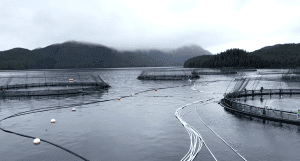Nestled in the heart of British Columbia’s central coast, the Kitasoo Xai’xais Nation is quietly making waves in Canadian food and farming. Their community of Klemtu, home to just 380 people, is the birthplace of Klemtu Spirit—a premium smoked salmon that’s capturing the attention of consumers across Canada.

A Tradition of Innovation
Fish farming isn’t new to the Kitasoo Xai’xais. As Roxanne Robinson, former Chief Councillor for the Spirit Bear Lodge shares, “Fish farming has been a part of who we are since the 80s. We started out with these small, locally owned farms—just to see the development over the years is really amazing.” Today, their partnership with Mowi Canada West has helped transform this tradition into a modern, sustainable industry.
The result? Klemtu Spirit, a four-year-old brand, now finds its way from the pristine waters of Klemtu to grocery store shelves nationwide. “To have something that is branded and grown and harvested and smoked within our community and out into the big box store like Walmart is pretty amazing,” says Robinson.

Sustainability at the Core
What sets Kitasoo Xai’xais salmon apart is their deep commitment to environmental stewardship. The community uses innovative technology to monitor and manage their fish farms. Underwater cameras and artificial intelligence help ensure that the salmon are fed just the right amount—minimizing waste and protecting the surrounding marine environment.
As one of the feed station operators explains, “The feeding part is the most critical. The largest cost for industry is food to feed the fish, so how do you manage that? The cameras show when the pellets are going down and when the fish are slowing down, so we know when to stop feeding.” This careful approach allows sites to rest and return to their natural state between harvests, supporting the long-term health of the ecosystem.


Community Well-Being and Opportunity
The impact of aquaculture in Klemtu goes far beyond the water. Today, 99% of the community is employed, with 51% of the local economy tied directly to the aquaculture industry. “People have the basic things that are required—a home, money in their pockets, food on their plates. It creates comfort,” Robinson notes.
The Klemtu Spirit processing plant is a hub of activity, employing everyone from single mothers to elders. “Our oldest employee is Clifford, who is into his 80s. He works whatever hours he can,” says Pam Chers, who works at the plant. “Basically, anybody is allowed to work here that lives in the village.”
This inclusive approach has helped the community thrive, bringing stability and pride. As Clifford, an elder, reflects, “My advice to some of the young people is don’t stop—keep going. Listen to Elders. They know because they’re Elders for a reason; they survived with knowledge from their ancestors.”
A Taste of Place
Klemtu Spirit salmon is more than just a product—it’s a reflection of the Kitasoo Xai’xais Nation’s values, heritage, and connection to the land and sea. Every fillet and smoked portion tells a story of resilience, innovation, and respect for tradition.
As Klemtu Spirit expands to stores across Canada and soon, the United States, it’s helping to build food literacy and confidence in Canadian food choices. When you choose Klemtu Spirit, you’re supporting sustainable Indigenous food systems, vibrant rural communities, and a uniquely Canadian story.
More inspiring stories:




 Food, Culture, And Confidence For The Next Generation
Food, Culture, And Confidence For The Next Generation